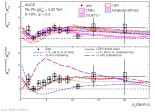Figures from paper submitted to Journal of High Energy Physics
Abstract:
The production of non-prompt ${\rm D}^{0}$ mesons from beauty-hadron decays was measured at midrapidity ($\left| y \right| <~ 0.5$) in Pb-Pb collisions at a nucleon-nucleon center-of-mass energy of $\sqrt{s_{\rm NN}}=5.02~\mathrm{TeV}$ with the ALICE experiment at the LHC. Their nuclear modification factor ($R_{\rm AA}$), measured for the first time down to $p_{\rm T}=1~\mathrm{GeV}/c$ in the $0-10$% and $30-50$% centrality classes, indicates a significant suppression, up to a factor of about three, for $p_{\rm T} > 5~\mathrm{GeV}/c$ in the $0-10$% central Pb-Pb collisions. The data are described by models that include both collisional and radiative processes in the calculation of beauty-quark energy loss in the quark-gluon plasma, and quark recombination in addition to fragmentation as a hadronisation mechanism. The ratio of the non-prompt to prompt ${\rm D}^{0}$-meson $R_{\rm AA}$ is larger than unity for $p_{\rm T} > 4~\mathrm{GeV}/c$ in the $0-10$% central Pb-Pb collisions, as predicted by models in which beauty quarks lose less energy than charm quarks in the quark-gluon plasma because of their larger mass.
JHEP 12 (2022) 126
e-Print: arXiv:2202.00815 | PDF | inSPIRE







